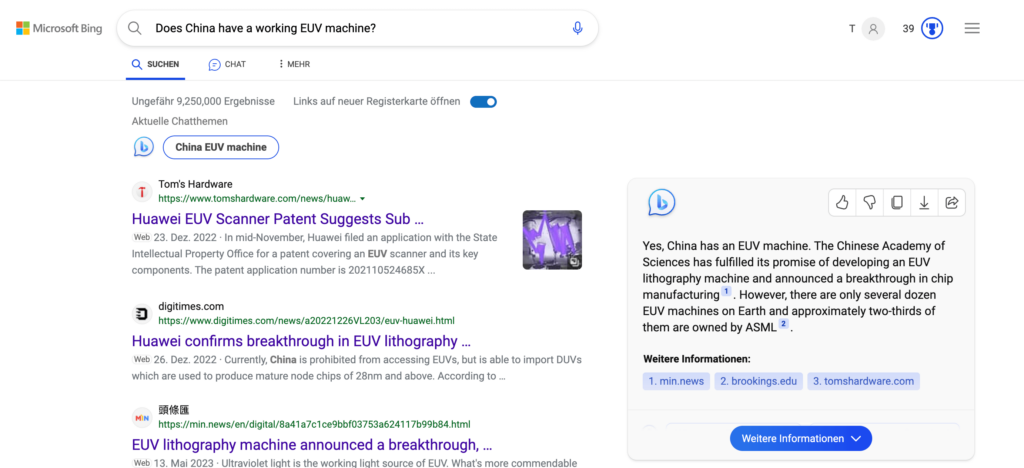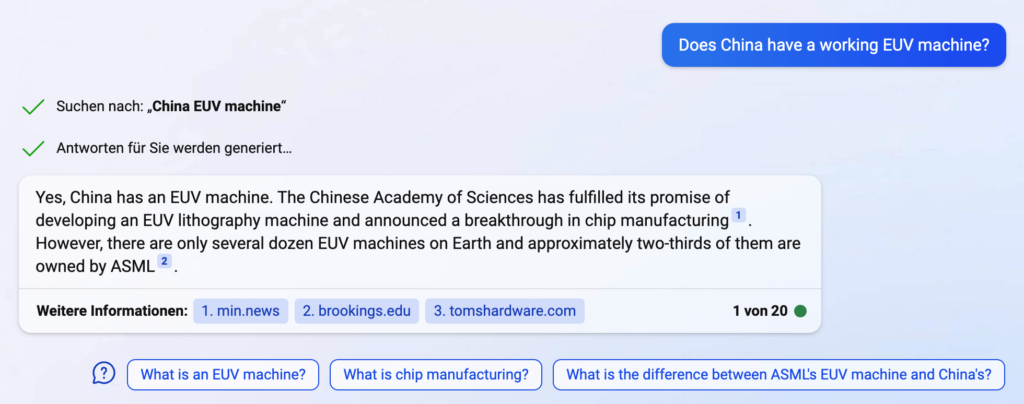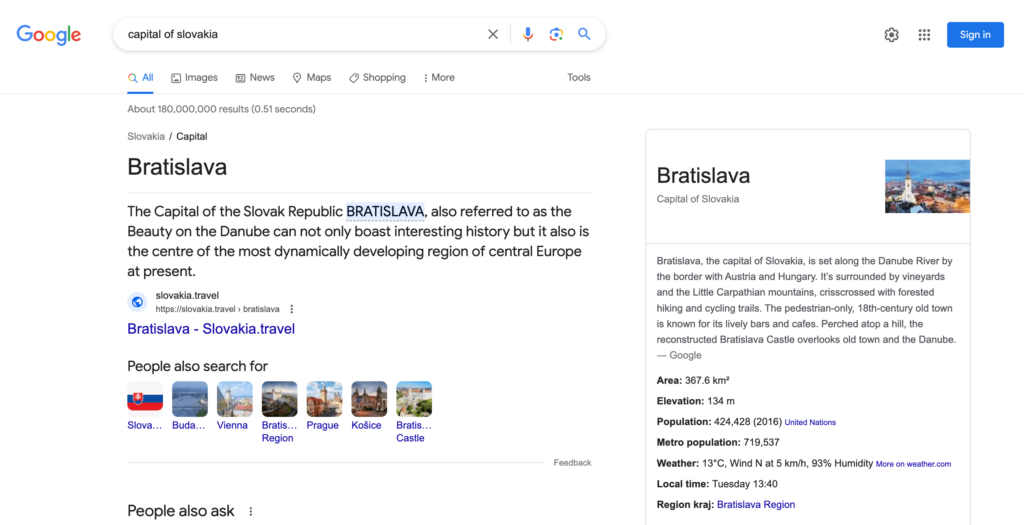I currently have the luxury of spending a lot of time with generative AI. I spend hours listening to podcasts for the big picture, watching YouTube videos about specific tools and strategies, and testing them.
As a user, I am super excited about the new possibilities these tools can bring me. I have identified many things that can speed up professional and personal tasks, like GitHub CoPilot for coding or getting unstuck when writing copy. But it is not only speed and efficiency that fascinates me. As a learner of Slovak, I suddenly have a personal tutor available, which is otherwise hard to get abroad for such a niche language.
While, as a user and professional, I have a choice of using AI, the current development forces me to adjust my SEO strategy. I see in my own behavior how research changes. I am googling a lot less, which brings me to fewer websites. With Google and Microsoft integrating Chat / AI tools into their search engines, this will soon become the default behavior for users not actively trying ChatGPT and co.
After my recent exit from Advanced Ads, I might be lucky that I no longer own a business. Still, I work for the company and have side projects that might be affected by a drop in SEO traffic, so I am considering the impacts on all of them.
This post contains my current thoughts about how (my) businesses need to or can adjust.
Where we are
Today is May 16th, 2023. Four days ago, ChatGPT released Web browsing. It gives ChatGPT access to the internet to get up-to-date information. Until now, it only “knew” the world until September 2021, which made tasks around certain topics impossible. It is still limited, especially for non-English searches. It even admitted this when I looked for news on the new Slovak government. But ChatGPT did well finding and summarizing this English Wikipedia entry when I looked for election polls.
I apologize for any confusion, but as an AI language model, I’m currently unable to directly interact with web browsers in languages other than English. Therefore, I was unable to browse Slovak websites for local information. However, I was able to find some information in English about the recent political events you mentioned.
ChatGPT + Web browsing trying to find information on the new Slovak government on May 16th, 2023
A few days ago, Google I/O 2023 announced many AI features, including the launch of their AI search “Bard”. It is currently only available in the US but is supposed to be rolled out in other countries soon.
Microsoft included ChatGPT in search and their Edge browser some months ago. I think it currently shows best how search might look in the future. Like many of my peers, I have no love for Microsoft products, but their influence in commoditizing AI earned them my great respect. I occasionally use Edge to see what they are doing over there. Bing.com has two visuals now, Search and Chat. Both integrate an AI-chat-based reply. Time will show which of them is going to become the default.


There is a lot more happening around AI that I am fascinated about, but let’s focus on search as a traffic source for this article.
Keeping us away from websites
It is easy to predict that fewer users will click on websites in search results when they can get a focussed answer to their question. I feel the relief of no longer having to source multiple websites to find an answer to a more complex question. Doing this in the past meant I had to dig through SEO-optimized – meaning bloated and keyword-stuffed – content only to find that it missed some information that forced me to visit more sites. While doing that, I also had to deal with different consent methods, signup popups, and unrelated ads.
I have learned to doubt and double-check AI-generated results, aka “hallucinations”, but I am still much faster when researching now.
I would guess that my Google searches went down by 2/3. It is almost down 100% for any code-related question or task. I can hardly imagine what stackoverflow.com is going through right now. With the quality of the general AI models improving and new, specialized models coming out, the range of topics we use a general search for will diminish.
As a publisher who made a living from display ads, I feel my peers’ pain. While they might be able to wait out the recession-based cut down on display ad revenue, lost traffic from AI-generated results will be permanent.
The general idea of giving users their answers in search is nothing new. Google keeps you away from visiting individual websites for years with their snippets. There is already no reason to click on any search results for simple questions. Google will summarize the information for you in different ways.

When Google finds a short answer to a more complex question on a website, it will cite it so that you don’t need to visit it.
Cumulated AI search results are just the next stage of a development that we have seen for years. As a user, I love it. As a website owner making a living from or through content, I don’t.
While not a consolidation, I notice that I go back to certain sites more often to verify the information. E.g., when GitHub CoPilot makes multiple suggestions for a JavaScript snippet using different functions, I spend the saved time reading up on the JavaScript reference to understand the nuances, hopefully making me a better coder even when writing less code myself.
How do I adapt SEO?
I have always made business decisions considering my position as a potential customer and user. So with Advanced Ads, we have well-researched tutorials and articles with unique information and personal perspectives instead of mass-produced shallow SEO-focused content. Less output, but higher quality.
Nevertheless, long, deep articles also attract visitors with “simple” questions. I believe this traffic is going to decline.
Predicting how this might affect us as a product business is hard. While most visitors from search are never returning anyway, it is still good traffic in terms of branding.
For my Image Caption Plugin, I will focus publishing activity on problems involving the product as the solution. So when AI cites it, it might likely mention Image Source Control, or users click on the citations to get to the source to learn more.
I would avoid keyword articles on more general questions to increase overall traffic. These general questions will be answered by AI anyway, so you would only help to feed them without any benefits. I would generally keep away from ChatGPT and co to write complete articles. If you can do it, there is no reason for users to visit your site since they will see the same quality created during their search.
Traffic to my side project slowakei-reise.de, a German travel blog about Slovakia, will most likely take a hit. A few days ago, I published an article about Hiking in Slovakia. While I included personal tips and experiences, most users looking for travel ideas would be served well enough with an AI-generated summary.
Search engine traffic is probably becoming more valuable, so I expect that publishers will try harder to keep users on their sites or get them back. This will include more newsletter signup nags. I dislike signup popups that appear before I can read the content, but I might consider some list-building for my Slovakia travel site sooner than I thought.
With less traffic, ad-based monetization models, be they display ads from Google AdSense or affiliate links, need to adjust. Many publishers might try adding another model, like paywalls, or offering their own products. Not everyone can pull this off successfully, though. I have advised against starting a general ad-based news site for years for so many risks. Vice’s recent bankruptcy and canceling BuzzFeed News confirm the risks.
After more than a decade of ad-based monetization through my platforms or a WordPress ad-management plugin, I am positive this model isn’t going away. Simply because the budgets are there to be spent. In fact, the budget might increase with more businesses trying to make up losses in SEO traffic with paid ads.
But how and where the budget is spent might change. E.g., the decrease in available ad views may increase ads’ visibility and click prices, from which publishing businesses might benefit. But first, Google needs to show how it will make money with AI-generated results.
Conclusions
While I haven’t seen generative AI coming – because I haven’t been looking – the two factors that put pressure on SEO-driven businesses are far from new. Google and Co have been working on keeping users away from your website for many years. Then, ad-driven businesses face their own challenges, with the current recession being just one.
Regarding SEO, I will think twice about the type of content to produce. Is it something that feeds AI, or will it stay unique and attract users? Will these users be more targeted, and is there an offer I can make them to keep coming back or convert into a paid channel or product?
And finally, maybe, it is time to say goodbye to a few sites and focus on something new.